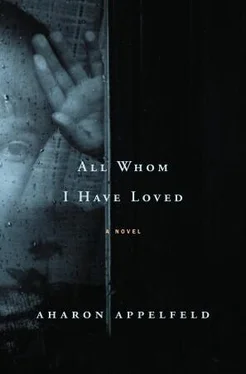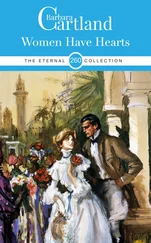“Are there rivers in the Carpathians?” I asked.
“There certainly are, but in the winter they're frozen over.”
“And what will we do there?”
“We'll ski.”
The word “ski” had such a wonderful sound that I immediately pictured the high hills, and Mother and I in winter coats, borne along on gusts of wind and floating over the surface of the white snow.
After the meal we went for a walk. It was a pleasant evening, wet from the afternoon rains, and we took the dirt track to the fields. At this time of the year the fields were gray and sad, and a kind of dull lowing rose from the dark valleys. Suddenly Mother went back to talking about the crowded classes at the school, the noise, and the uproar in the corridors.
We made our way back along the avenue of chestnut trees that led from the fields to the city. The trees were already bare, and their large leaves lay on the ground yellow and trampled. The farther we went, the more the damp evening seemed to bring to mind other evenings, but where and when I do not know. Since we'd left Father in Czernowitz, it was as if my life had been torn in two. Sometimes it seemed that I was walking with him and breathing in his silence and the scent of his cigarettes.
Suddenly the lights of evening turned red, and I saw Father standing next to me, and it wasn't only him I saw but the street that leads to the tavern as well. But then people were addressing him, and he wasn't answering. Speech was frozen in him, and only when the waitress had served him his third drink did a thin crack of a smile spread across his face, and he called out: “To all those who sit in taverns, and to all those wretched people who have never tasted a drink.” On hearing this, the waitress burst out laughing and said, “Where did you get that toast from?”
“From the heart.”
For a moment I was very indignant that on Mother's birthday my thoughts were with Father. “Mother,” I said, wanting to apologize.
“What, my love?” Mother asked tenderly.
“I love you so much.”
“Me, too,” she said, and kissed my head.
When we returned home, Mother got another one of her headaches. She lay on the bed and I sat next to her. When she had these headaches, I wouldn't speak to her. I gazed at her breathing and at her hair gathered behind her. For a long time I sat and gazed at her, and eventually I fell asleep.
The next day Halina came wearing an embroidered linen dress. She had already learned some words of German and I some words of Ruthenian, but it was hard for us to speak. I told her about Mother's birthday and about the evening walk along the avenue of chestnut trees. The story did not impress her. Her thoughts were usually on birds; they were not afraid of her, and they would come to peck seeds from her palms. She would stroke them and speak to them, and put them on her shoulders. They were in no hurry to fly away.
“Halina, what language do you speak to them?”
“Ruthenian.”
“And they understand?”
“Every word,” she said, and burst out laughing.
Her eyes and hands were more fluent than her mouth. With her hands, she explained many things to me. Her gestures no longer seemed strange. I noticed that around her neck she wore a chain with Jesus on the cross. I had seen the crucified Jesus Christ on my walks with Father when we visited the chapels. I asked Father a lot about him and his crucifixion. Father's explanations were so abrupt that it was hard to understand them.
“What's this?” I asked Halina, and I pointed to the cross.
She raised her hand and with a finger pointed to the sky.
“He's God? Really?”
It was hard for me to understand how God, who's so mighty, could squeeze himself down into a simple likeness, so He could be worn around someone's neck. I wanted to ask her about this, but I didn't know how.
Later Halina surprised me and asked, “How old are you?”
I told her.
“And why don't you go to school?”
“I have asthma.”
“What is asthma?”
I told her.
“You poor thing.”
I'm not a poor thing, I was about to say.
“How many years have you had the illness?” she asked.
“From childhood.”
“And are you suffering right now?”
“Now I'm breathing like a bird.” I tried to impress her.
My mysterious illness was a secret between Father and myself. In my early childhood, a doctor diagnosed asthma. Father latched on to this and had me exempted from school. Apparently Mother was against this, but Father returned triumphant from the Ministry of Education: “I've got Paul exempted from the house of slavery.”
I was then six years old. Many events have been erased from my memory, but not the sight of Father on his return from the Ministry of Education. For he had freed me not only from school but from all the hardships that awaited me in life.
Even as autumn darkens the windows of the house, Mother tells me that from now on she will also be working in the afternoons, and Halina will look after me all day. I do not ask why. Halina is pleasant company; we play hide-and-seek and entice birds to us with crumbs of bread, we play on the main street and in the fields, and when it's not raining we go to the river. By the time Mother returns at night, I'm so immersed in our games that I scarcely notice her.
Halina tells Mother what we've done and what I've eaten. In the afternoon she bathes me in a large tub, puts me on her knees to dry me, and declares, “Such a nice strong boy, all the girls will want to kiss him!” Then she sinks her mouth into my upper arms and my thighs and adds, “Very tasty, the tastiest.”
This hurts a little but it is not without pleasure. She dresses me in a sailor outfit.
Every day Halina learns new words and immediately uses them; I learn, too, but not as fast. Sometimes we sit on the banks of the river and talk. Halina lives in a village near Storozynetz, and she has a fiancé. The fiancé is in the army, and she plans to marry him when he is released.
“Is he handsome?” I ask.
“Yes, he's handsome,” she says, and for some reason it hurts me.
“When does he come?” I ask her.
“From time to time.”
That is a slight consolation. I feel that I have already known Halina for a long time — since my walk with Father along the banks of the Prut, when I saw the girls doing their washing on its banks, except that then she was distant and unattainable and now she is so near me, I can touch her neck.
Mother has changed over the past weeks: she still complains about headaches, but less frequently. Now a hidden smile plays on her lips. She sits and corrects notebooks late into the night.
“What's happened, Mother?” I have to ask.
“Nothing, why?”
At first glance, there's no change at all, but when she gets up and goes to the writing table, I notice a movement I haven't seen before. She pulls back her hair with both her hands, shakes her head, and then lets it fall loose. Mother has long, golden tresses, which used to be gathered in a heavy braid. When we left the city and moved to the provinces, she cut off the braid, but her hair is still long and flowing and looks lovely on her back.
We sleep together in a wide bed. I usually sleep deeply now and seldom awaken at night, but sometimes toward morning I awaken and gaze at Mother's face. I see that she is fighting off bad dreams, and I want to wake her up and help free her from the clutches of the demons. But in recent weeks, I've noticed that her sleep is calm and her lips parted, and she seems to be smiling.
“Mother, you were smiling in your sleep,” I tell her.
“Was I?”
“I saw you smile.”
“Perhaps.”
The rain falls incessantly. Halina no longer takes me out to the fields, and most of the day we sit on the floor or by the window. When the rain lets up, we go to buy ice cream. At the end of the street, Halina has found a shack where they sell homemade ice cream. It's soft and tasty. Then we hurry back home so that we won't be caught in a sudden shower.
Читать дальше












